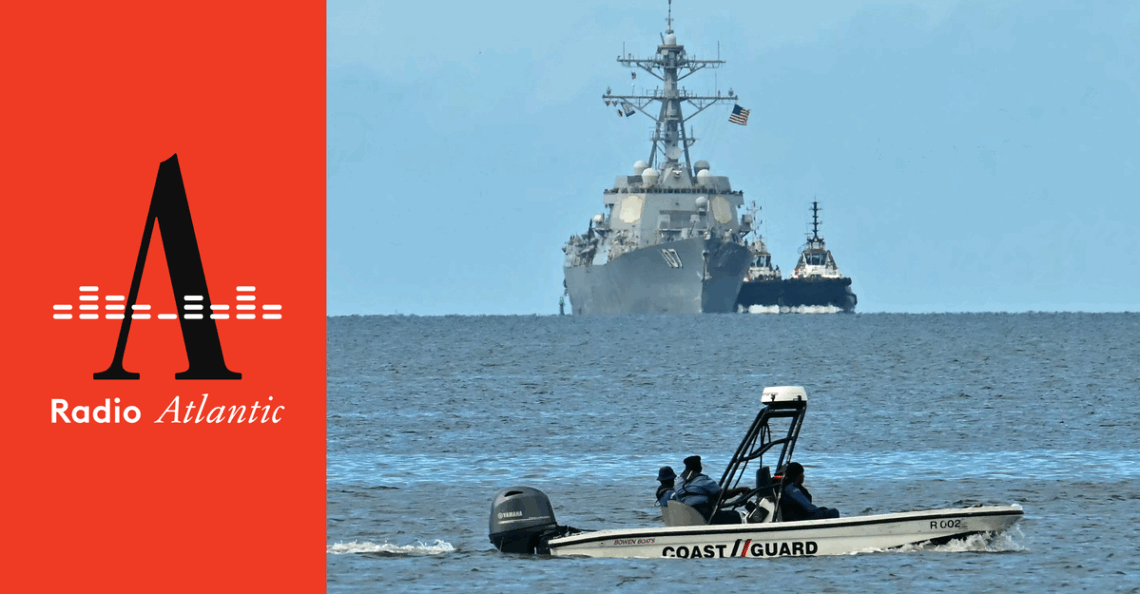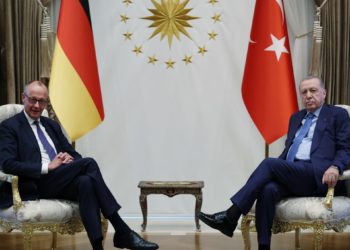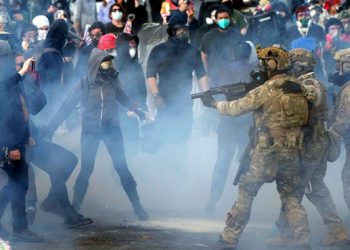Subscribe here: Apple Podcasts | Spotify | YouTube | Overcast | Pocket Casts
So far, the United States has blown up 14 boats in the Caribbean and the Pacific, killing at least 57 people. In the two months since the strikes began, the administration has consistently offered the same explanation: The U.S. has a fentanyl-overdose problem, and those boats are a source of the drug. The federal government has stuck to that line despite the Drug Enforcement Administration and Department of Homeland Security saying most of the fentanyl brought into this country comes from Mexico, not through the Caribbean. Anyone with further questions is out of luck. There have been no presidential policy speeches, no big Pentagon press conferences. In fact, a few weeks into the boat-strike campaign, Defense Secretary Pete Hegseth instituted restrictions on journalists so severe that most media outlets gave up their press passes rather than submit.
Experts on Central and South America are playing a lively foreign-policy guessing game about the administration’s real aims. Does President Donald Trump see regime change in Venezuela as unfinished business from his first term? (The U.S. indicted the country’s president, Nicolás Maduro, in 2020 on drug charges and called his election last year “illegitimate.”) Is this about Secretary of State Marco Rubio’s siding with the Venezuelan opposition? Or does it have more to do with Deputy Chief of Staff Stephen Miller’s desire to stem the flow of migrants from the country? Is America about to go to war with Venezuela, now that Trump is hinting he might hit targets on land and the world’s largest aircraft carrier is headed to the region? Or is it simply a show of strength meant to intimidate Maduro into giving up power?
Wherever the conflict in the Caribbean goes next, the Trump administration has already crossed a line. For decades, drug trafficking has been a law-enforcement issue, not a military one, with clear rules about who could be stopped, who could be searched, and who could be killed. Now the government is justifying these boat strikes by calling the targets “narco-terrorists,” but presenting no supporting evidence to the public. Meanwhile, in some American cities, the administration has begun deploying the National Guard—and perhaps “more than the National Guard,” as the president recently suggested.
So what comes next? This week on Radio Atlantic, the Atlantic staff writer Nancy Youssef, who covers national security. She joins the show to discuss Venezuela and how the administration is using the military in unusual ways without really explaining itself.
The following is a transcript of the episode:
[Music]
Tom Llamas (from NBC News): We come on the air tonight with breaking news: The U.S. has launched a military strike against a boat in the Caribbean, killing 11 people on board.
Nancy Youssef: So starting on September 2, the United States started striking boats in international waters as they were leaving Venezuela.
Llamas: The president says the boat was part of a cartel operation carrying drugs from Venezuela and heading right towards the U.S.
Youssef: The way the United States justified it is that they said these are “narco-terrorists” that pose this threat to the United States, and the way to combat the fentanyl-overdose problem in the United States is to take out the source of it, which is these boats.
Hanna Rosin: This is Atlantic staff writer Nancy Youssef, who covers national security.
Youssef: The problem is, we don’t know who are on these boats, why these boats versus others are being targeted, what was on those boats. In addition, fentanyl doesn’t come from that part of the Caribbean.
Senator Mark Kelly (from CBS): We wanna keep fentanyl out of the United States, and I don’t know how widely known this is, but those routes through the Caribbean are predominantly used to bring cocaine to Europe.
Rosin: That was Senator Mark Kelly, and he’s right. According to the DEA and DHS, most of the fentanyl trafficked into the U.S. comes from Mexico. And the boats that we’ve seen sunk, they look like small fishing vessels that would struggle to make the thousand-mile journey to the U.S. Despite what [President Donald] Trump says about Venezuelan President Nicolás Maduro, fentanyl does not come through the Caribbean.
So why is the Trump administration killing people over it?
Youssef: If fentanyl’s not coming from there and you’ve declared that that is the problem drug, and the boats can’t reach the United States, I’m having a hard time understanding what legal justification there is.
I’m not saying you have to let them all go, but to use military action to put that threat down rather than using a law-enforcement measure, that’s what I’m having a hard time from. The use of military force should be exceptional and should be for threats to the country and should be for threats that we, as a country, agree need to be addressed with militarily.
To me, none of those standards have been met here.
Rosin: I’m Hanna Rosin. This is Radio Atlantic. Since the strikes began two months ago, the U.S. has blown up at least 14 boats and killed almost 60 people.
Last week, Defense Secretary Pete Hegseth ordered the largest aircraft carrier in the world, the USS Gerald [R.] Ford, to waters off Venezuela.
And now Trump is talking about striking targets on land.
President Donald Trump (from NBC News): Something very serious is gonna happen, the equivalent of what’s happening by sea, and we’re going to Congress just to tell ’em what we’re doing.
Rosin: Nancy, there have already been a number of boat strikes in the Caribbean, so why is the arrival of this aircraft carrier significant?
Youssef: The arrival of the USS Gerald Ford Carrier Strike Group essentially allows the United States to potentially strike ashore. So we’ll have, by early next week, more ships than we’ve had since the Cuban missile crisis.
And the carrier strike group is particularly notable because we only have 11, and so when the U.S. commits one to the region, it really signals something about its commitment to either support an ally or for potential military action.
Rosin: Got it. So it’s a message, and it could be just a message, or it could be more than a message.
Youssef: Yeah, the reason we’re all thinking it would be more is because we haven’t seen a carrier strike group in that region in such a long time.
So I’ll give you an example: One place where we often see the carrier sent as messaging is in the Middle East, where the U.S. will send it as a form of, for example, deterrence message to Iran or to show support for Israel when it faces potential threats.
So I think there’s more expectation that something will happen in the Caribbean because we haven’t had one there in so long.
Rosin: Okay. Got it. But to step back, why is the Trump administration doing this in the first place? If fentanyl isn’t coming into the U.S. from Venezuela but from Mexico, why are these boat strikes even happening?
Youssef: So I think of this as a Venn diagram, where the strikes kind of are in the middle.
[Music]
Youssef: Secretary of State Marco Rubio has long supported the Venezuelan opposition groups and seen Maduro as authoritarian, as a tyrant who has been unwilling to leave office, and that the U.S. should be supporting that opposition to bringing democratic reforms to Venezuela as a potential means to not only stabilize Venezuela, but potentially reshape parts of the region.
Secretary of State Marco Rubio (from DW): The Maduro regime is not a government—it’s not a legitimate government. We’ve never recognized them as such. They are a criminal enterprise that basically has taken control of national territory.
Youssef: I think Stephen Miller sees this as an anti-immigration measure and that, if you can stem the instability in Venezuela, you can stop the flow of migrants.
The president has signaled, first of all, his particular frustration with Maduro, dating back to his first term, and that he wants to see the military used in a more law-enforcement kind of way.
And so in the middle are those strikes. And I think there’s an overall feeling that, if the U.S. strikes boats—even boats that might not pose a preeminent threat to the United States—that others will see it, and it’ll be a form of deterrence.
So I think that’s what’s going on, but having said that, we haven’t had a policy speech, we haven’t had a press conference at the DOD to answer these questions, so we’re trying to put pieces of this opaque puzzle together to kind of figure out what’s happening.
Rosin: I wanna break this down—there are two separate questions. One is: Do we know if these are drug boats or fishing boats? Do you feel certain about that? Does anybody feel certain about that?
Youssef: The short answer is no. We have tried to find relatives of those who’ve been killed to get a sense of who they are. The president of Colombia said that one of ’em was only carrying a fisherman. We don’t know. Is it possible that some of these boats are carrying fishermen who decide to sort of take a shipment to sort of make extra money? We just don’t know.
The U.S. says that it has intelligence, that it’s been tracking these boats for a long period of time, but again, without any specifics, it’s very hard to say anything for certain because we don’t have names, we don’t have any details about why these boats are being struck. And so you can sort of see large cargo on these boats sometimes, but certainly not enough to make a solid determination that they posed an imminent threat, so much so that they required a U.S. military strike rather than an interdiction or other response.
Rosin: Okay, so there’s a question mark over “Are they drug boats or fishing boats?” Whether they’re drug boats or fishing boats, how unusual are these kinds of military strikes?
Youssef: I would describe them as unusual. The U.S., in the past, when they have faced these kinds of boats coming—let’s assume they’re drug boats—when they’ve seen drug boats that they think pose a threat to the United States, it has been treated as a law-enforcement issue.
What is happening here is that the United States is taking lethal strikes on these boats in international waters and saying that this demands military action, that this poses an imminent threat to U.S. national security requiring military intervention rather than law-enforcement intervention. And really using a lot of the same language that we heard in reference to the global War on Terror. Rather than “criminals,” they’re being described as “terrorists,” for example. They’re “combatants”; they’re not “drug traffickers.”
There’s been a lot of change in language. And that’s important because, I think, those who have questions about it would note that al-Qaeda, ISIS, some of these terror groups that we heard about for so [many] years, stated that their mission was to destroy the United States, whereas those trafficking drugs have not indicated that that is their aim. What they have indicated is that they want financial benefit. Their aims are not ideological; they’re financial.
Rosin: I see what you’re saying about the language being important, because if they are drug traffickers—maybe this metaphor is too blunt—isn’t this the equivalent of, say, a police officer sees someone dealing drugs and kills them?
Youssef: In some ways, yes, because there’s no due process in all this. I don’t know why that person had to be killed with a military strike. I don’t even know what kind of strike is being conducted. I don’t know why this requires a sizable portion of the United States Navy assets in the region. I don’t understand why this is such a threat that we’re pulling resources away from support for our allies, for example.
And we’re not getting answers to those questions, and Congress isn’t getting answers to those questions. And so, if you believe that the authorization for war has to come from Congress—or, at least, they have to be notified—that’s not happened here.
Rosin: You mentioned an absence of information. We don’t really know who’s on these boats. We don’t have a lot of information. This is also coming at a time when the Pentagon has barred reporters. Can you tell us about that change?
Youssef: The Pentagon’s a unique place for reporters. People think of the Pentagon as this big building of war planning and everything else, which I guess it is, but really, it’s an office building. There’s a CVS there. There’s a Popeyes there. There’s a Taco Bell there. There’s a shoeshine. There’s a dry cleaners. It’s a little mini city—and filled with offices. Hundreds, if not thousands, of doors in that building.
And we, as reporters, because of the way the building was sort of physically configured, were allowed to walk anywhere in the hallways of that building—and, obviously, not in secure spaces—and we’d done so since it opened in 1943.
And the current secretary of defense decided that if we wanted to continue to be able to report from that building, we had to sign rules that said that we would not ask for information or publish anything that was not approved by the department, and that we would agree that any information, even unclassified information, that was published could pose a potential national-security threat.
And so the vast majority of the press corps decided that they couldn’t sign that, because to sign that would be to say, We’re no longer journalists, but stenographers. It’s not our job to simply report what the department wants us to report. And so we all walked out collectively.
The intersection with Venezuela is: It is much, much, much harder for us to get basic information, and we’re all feeling it in the sense that there’s been excellent journalism since then, but it’s been harder to get answers to basic questions because it’s not just that we’re not allowed in the building, but there is a climate of fear in that building. People are afraid to talk. The secretary has threatened or polygraphed top officers and created a sense that there’s real repercussions for engaging with the press.
And so, at a time when we’re seeing a real ramp-up of the U.S. military presence in the Caribbean Sea, we can’t get information. There are no press conferences that are held. We’re learning about things like the deployment of the USS Gerald Ford by tweet, and there was no opportunity to ask a follow-up question: When does the Ford get there? Why is it going there? Why this carrier? Will it be followed up by other carriers? How long will it be there? What is the mission?
There’s no opportunity to ask those questions, and so it’s made it much harder to provide the American public the kind of answers to the questions that you’re asking.
[Music]
Youssef: Reporting, to me, is being in a very large room with a very small flashlight, and you’re just trying to figure out, What am I seeing, and what can I take from it? And to me, the aperture has shrunk.
Rosin: So the administration is using the military in new and unusual ways, and limiting the press’s ability to track that. Is anyone pushing back?
That’s after the break.
[Break]
Rosin: To summarize, the U.S. is killing people in seemingly extralegal ways. They’re using the military in situations where they used to use law enforcement. That’s unusual, and we’re not sure how far they can stretch that.
At the same time, there’s a vacuum of information. Is there any debate or dissent?
Nancy, what do you know about members of Congress or people inside the military questioning these actions?
Youssef: Well, we do have some indications of frustration—I’ll start with the military and then on the Hill. Admiral Alvin Holsey, who is the commander of U.S. Southern Command, which is responsible for all military operations in that region, unexpectedly submitted his resignation one year into what was supposed to be a three-year job. We know, based on our own reporting, there had been tense conversations between him and his civilian leadership about these strikes and some of the legal questions around them.
Courtney Kube (from NBC News): In a statement, Admiral Holsey said, “It’s been an honor to serve,” but he didn’t say why he was retiring. It comes just after President Trump floated the idea of strikes against cartels inside Venezuela and that he authorized covert action there.
Youssef: On the Hill, we’ve seen a growing number of Republicans express concern—I think Rand Paul’s been one of the most vocal—
Senator Rand Paul (from Fox Business): You cannot have a policy where you just allege that someone is guilty of something and then kill them.
Youssef: —raising questions about the legality of these strikes.
Paul: We interdict ships all the time off the coast of Miami, off the coast of California, and the Coast Guard statistics say that about 25 percent of the boats that we stop to search don’t have any drugs.
So if one out of four of the boats don’t have drugs on them—what kind of person would justify blowing up people when one out of four boats may well not have drugs on ’em?
Youssef: We know that there was quite a tense meeting between a top Pentagon lawyer and the Senate Armed Services Committee in which even Republicans were getting frustrated because they couldn’t get specific answers. There was a vote recently to sort of indicate Congress’s objections to these strikes that did not pass. So we know that there are concerns.
Rosin: Nancy, this isn’t the first time that the U.S. has policed Central and South America—you know the term America’s backyard. So this setup is somewhat familiar.
Youssef: But we haven’t done it with this kind of force posture. We’ve done things like training and—I mean, we’ve done things; don’t get me wrong. And, by the way, our interventions haven’t always gone so great. (Laughs.)
Rosin: Right, it’s a very spotty history of intervention in Central and South America, but it’s a familiar history.
Youssef: Yeah, what stuns me is the size and scale of it—the U.S. administration’s stated goal of moving away from a force posture in other parts of the world towards the hemisphere also has me thinking about it in these terms.
Rosin: And what are the options for engagement? What do you see as totally outside the possibility, and what seems in the realm of the plausible in terms of escalation?
Youssef: So the most minimal engagement would be none at all, that the carrier is there as a show of force, to signal the United States’ commitment to going after drug traffickers. That’s sort of one end of the spectrum.
Possible. Seems unlikely, given the amount of power you’re bringing to the region.
The other extreme would be a ground invasion.
Again, possible but not likely, based on our reporting and the indications we have so far, because you don’t bring in a Navy for ground war, right? (Laughs.) If we saw the 82nd Airborne deploying as well, then I’d be making a different assessment.
But having said that, I can’t tell you specifically what it could be. Could it be a series of strikes over a period of days or weeks, something akin to what we saw in the campaign against the Houthis in Yemen? Could it be a salvo of strikes one day like we saw against the nuclear sites in Iran? Could it be something totally different?
I think what the carrier opens up is the possibility for strikes ashore on Venezuela, on the infrastructure supporting drug cartels or maybe houses owned by some of these narco groups.
Rosin: But if the ultimate goal is to topple the Maduro government, like, if you were Marco Rubio and you were—they are pretty open about wanting regime change, what would be the scenario?
Youssef: So from what we can tell, their hope is that these strikes create enough pressure that either Maduro flees, or you see defections inside his military that say, You have to go.
The challenge is, the last time we were in something similar to this situation in Venezuela was 2019, and there were hundreds of defections then. There’s no indication of defections so far, given the strikes that have happened. And so if you think of this as, “How many shakes does it take to tip over whatever it is you’re trying to get out of the vending machine?,” that’s the calculation: that this will be the shake that’ll sort of tip it over.
What we haven’t heard is an extensive conversation of what follows that. And there are a lot of groups within Venezuela, armed groups and supporters of the Maduro regime, that are likely to react in some way if there’s a change. And so, to me, it’s sort of akin to the fall of [Muammar] Gaddafi in Libya—or that’s the risk, anyway—is that there’s minimal sort of outside intervention, it leads to sort of an internal change, but there are so many factions internally that fight for control that it leads to a new kind of instability. That’s the risk right now.
Now, having said that, the opposition have said that they are prepared to step in, that they have a plan for how to run the country. But that appears to be sort of how the strategy is shaping up in terms of potentially affecting events in Venezuela, if you believe that these strikes are being driven by a desire to see a regime collapse within Venezuela.
Rosin: Right, and we should note that some in the Venezuelan opposition are in favor of U.S. involvement. I think that’s important to mention.
But, Nancy, I wanna expand beyond Venezuela. As you’ve noted, the administration is using the military in a new way there. But the administration also seems to be testing other kinds of unusual uses of the military, like deploying them in a half-dozen cities, the National Guard here in D.C. Do you connect all these things? Do you see, maybe, a fundamentally different idea about the military emerging?
Youssef: One thing that I’ve been struck by reporting in places like Egypt and Libya and Bahrain is that their militaries are there, in large part, to combat domestic threats. And what has made the United States so unique is it’s a large, powerful force designed to protect the United States from external threats, that when we have threats internally, that that is to be handled by law-enforcement agencies, not military force. And now we’re seeing a military that is more inwardly directed, or at least more directed towards this hemisphere, right? And that’s a big shift.
To me, the thing that I’m watching for is where U.S. military standing relative to the American public ends up a year from now or two years from now. Because the other thing that’s happening at the same time is that the secretary has indicated that he doesn’t see diversity as a strength of the military. He’s not enthusiastic about women joining the ranks, and in fact, we’ve seen a lot of minority officers and female officers asked to leave or deciding to leave, including Admiral Holsey himself.
And so it portends of a force that looks less like a representative of the American public and more like a representative of those who support the president. It’s a different relationship that it has with the American public.
So that’s the thing I’m watching in the long term: How does all this shift how we think of our military and how much it’s seen as being America’s military, an apolitical force? How long does that hold?
Rosin: That is a real fundamental shift. Do you think of yourself as potentially covering a pretty fundamentally different military than you did at the start of your career?
Youssef: Yes, because how can you not when you’re seeing it deployed in such a different way? How it’s deployed is sort of how we see it. And I could be wrong, but you can’t help but ask these questions when you’re seeing these kinds of shifts happening. It does feel different to me. And it’s the totality of it; it’s not one thing.
Rosin: Well, Nancy, thank you so much for explaining your work to us.
Youssef: Thank you.
[Music]
Rosin: This episode of Radio Atlantic was produced by Rosie Hughes and Kevin Townsend. It was edited by Claudine Ebeid and fact-checked by Álex Maroño Porto. Rob Smierciak engineered this episode and provided original music. Claudine Ebeid is the executive producer of Atlantic audio, and Andrea Valdez is our managing editor.
Listeners, if you like what you hear on Radio Atlantic, you can support our work and the work of all Atlantic journalists when you subscribe to The Atlantic at TheAtlantic.com/listener.
Also, I have a favor to ask: I’m interviewing chef and cookbook writer Alison Roman in a couple of weeks. If you have any questions for her—recipe-related, biography-related, cookbook-related, Thanksgiving-related—please email them to me at [email protected].
I’m Hanna Rosin. Thank you for listening.
The post Strike First, Explain Never appeared first on The Atlantic.




